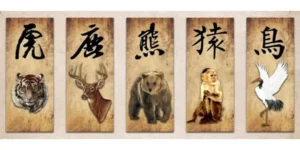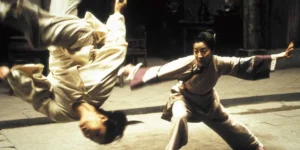China is the birthplace of kung fu, an art that has been developed for thousands of years. Kung fu is one of the oldest and most complex martial arts in existence. There are many different styles of kung fu, such as Tai Chi, Shaolin, Qigong, and Mantis Quan. If you choose to learn kung fu in China, you’ll need to understand what kung fu schools teach.
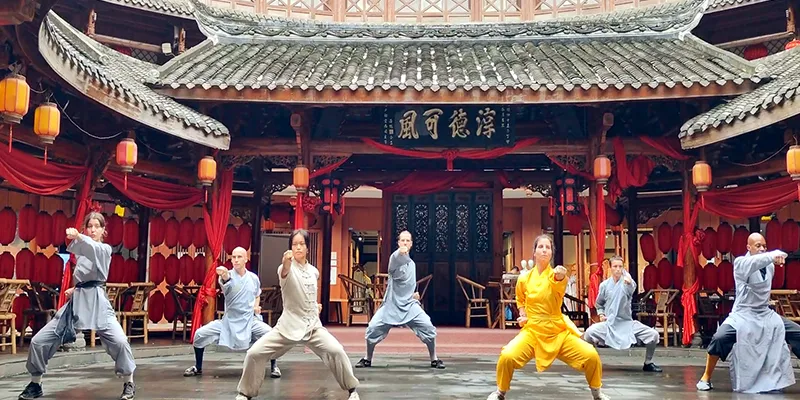
This guide mainly introduces you to excellent kung fu school courses and life in China.
Excellent Kung Fu Schools in China Courses and Life
Shen Jiangfei Martial Arts Center
Authentic Tai Chi training base in China, Shen Jiangfei Martial Arts School is located in Longhu Mountain. Here, you can learn authentic, traditional Tai Chi, Shaolin, Qigong, standing meditation, meditation, and wellness retreats. Personalized instruction is provided for all abilities and skill levels. Shen Jiangfei School offers summer camps and short-term, mid-term, and long-term programs.
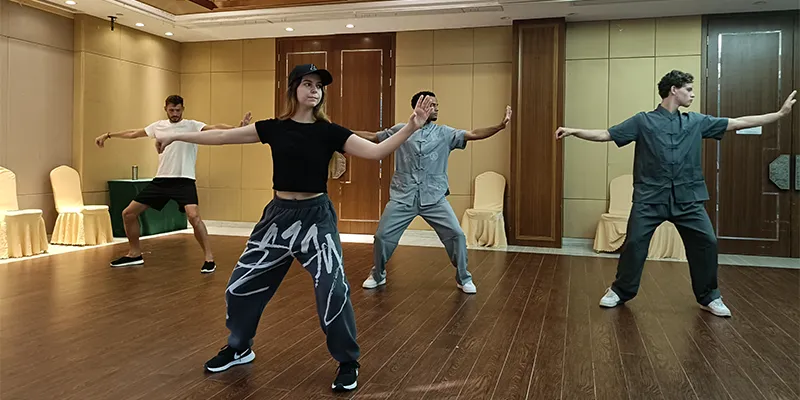
Located in Longhushan, Shen Jiangfei Kung Fu School offers authentic training in Tai Chi, Shaolin, Qigong, and other traditional Chinese martial arts. Reasonable pricing includes full-time training, strength training, wrestling, and conditioning; three meals a day; hot showers; accommodation; and a common room.
Training is led by Shen Jiangfei, a descendant of the Hequan Dizong school and the 11th-generation inheritor of Chen-style Tai Chi.
Shaolin Temple Tagou Martial Arts School
Shaolin Temple Tagou Kung Fu School is China’s largest and most excellent kung fu school. Kung fu styles include all styles of Shaolin Kung Fu, Shaolin weapons, Tai Chi, Qigong, Buddhist health preservation, Xingyiquan, Tai Chi, Baguazhang, Sanda, wrestling, boxing, and more. You can also take Chinese language classes and attend martial arts performances.
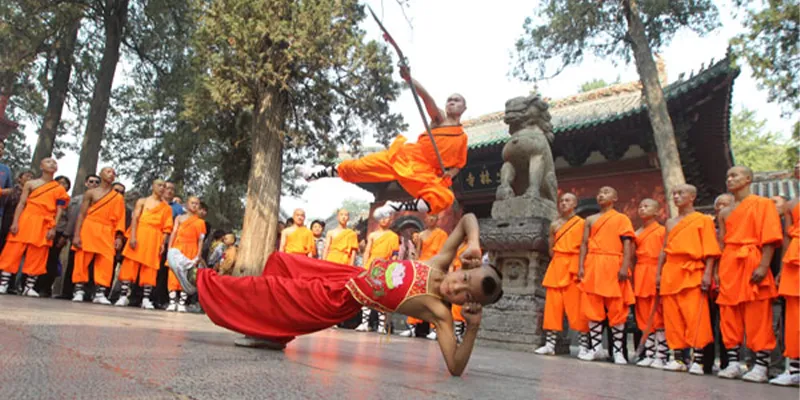
Students at Shaolin Tagou are taught by Shaolin Temple faculty, international martial arts instructors, and martial arts coaches. They train in small groups, six days a week, with daily practice sessions exceeding six hours. The Shaolin Temple’s average annual temperature is around 14.2°C, making it ideal for moderate- to high-intensity training.
All foreign students are accommodated in three-star hotel-style rooms, each equipped with internet, air conditioning, and 12-hour hot water for your comfort. Tagou School also offers full board and lodging, with menus changing daily. Sunday dining options are also available, allowing you to sample local Chinese cuisine.
YunTai Mountain International Culture and Martial Arts School
Located within the Yuntaishan Geopark, Yuntaishan International Martial Arts School offers training in Shaolin Kung Fu, Wushu, Sanda, Tai Chi, Qigong, and more. It welcomes students of all ages, genders, backgrounds, and experiences. The monthly fee is just $590, including training, elective courses, accommodation, meals, and scenic area entrance fees.
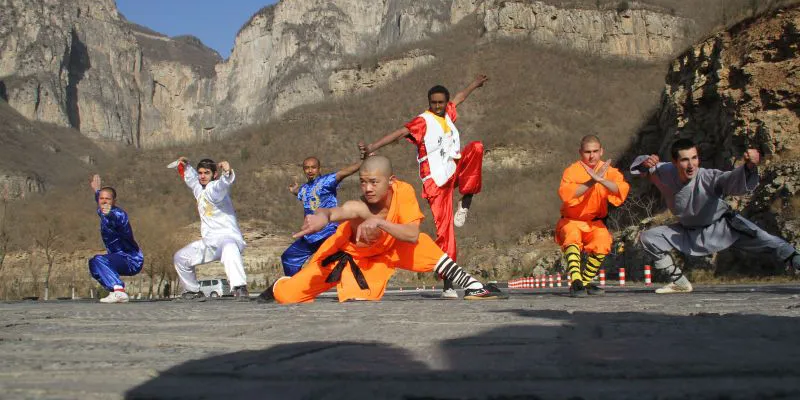
Yuntai Shan Kung Fu School employs experienced Shaolin-certified masters who have practiced Shaolin Kung Fu since childhood. Professional training is available six days a week for all ages, genders, and skill levels. The school also offers high-quality indoor and outdoor training, boxing/punching bags, martial arts equipment, calligraphy, and tea ceremony classes.
Yuntai Shan International School is more than just a school; it also offers healthy food, a running track, table tennis, basketball courts, a Chinese chess area, and a tea room, giving you a sense of the Chinese community atmosphere.
Shaolin Temple Kung Fu Academy
Shaolin Temple Wushu School is China’s oldest and largest kung fu school, located at Shaolin Temple on Songshan Mountain in Dengfeng City, Henan Province. It primarily teaches Shaolin kung fu and Shaolin weapons (swords, spears, and staffs), as well as draft classes in qigong, tai chi, free fighting, boxing, taekwondo, and meditation. Long-term students pay $100-200 per month, while short-term students pay $200-300 per month.
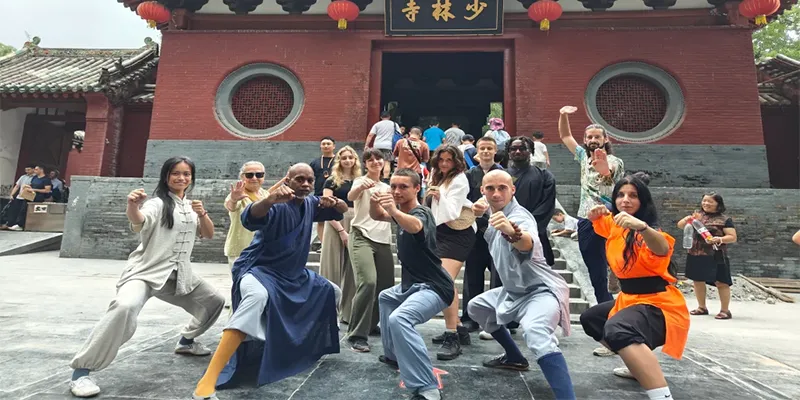
The Kung Fu school invites outstanding kung fu masters to teach students, mastering various Chinese martial arts styles. Not only are students studying within the scenic Shaolin Temple grounds, but they also provide warm, fully equipped accommodations. The academy offers hotel-style rooms, with no roommates assigned, allowing students to choose between single and double rooms.
Three meals a day are all Chinese cuisine, and other things can be purchased at the student market. Students also celebrate four major festivals annually: Chinese New Year, Mid-Autumn Festival, the school’s anniversary celebration, and Christmas.
Wudang Mountain Kung Fu Academy
Wudang Mountain Kung Fu School is located in Wudang Mountain, China, the birthplace of internal martial arts. The school specializes in Tai Chi, Wudang Kung Fu, Xing Yi Quan, Ba Gua Zhang, Chi Kung, Meditation, Liang Yi, and Sanda. The school utilizes traditional training methods tailored to international students, with small classes of up to 10 students per class and a well-planned training schedule of five days a week for over six hours per day.
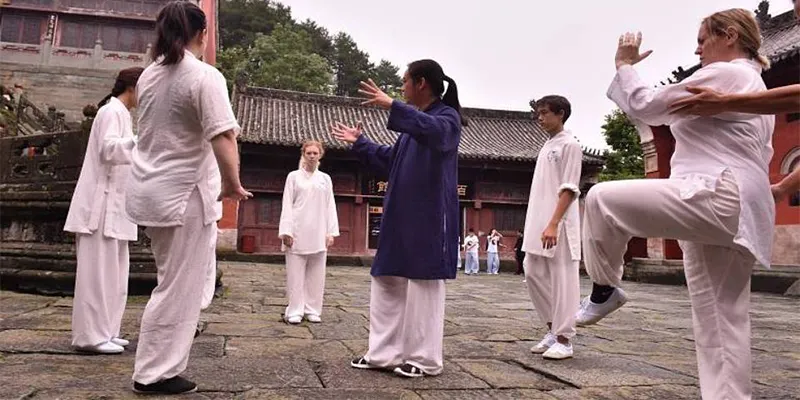
All students are trained by the authentic Wudang Masters from the original Wudang Mountain, the level 9 of the Chinese Martial Arts Grading System (the highest level) instructor, or other highly qualified martial artists with excellent teaching ability, personality, and experience.
Tuition fees include Kung Fu, training facilities, hotel-style room, three meals a day, Mandarin, calligraphy, certificates, etc.
Song Mountain Shaolin Kung Fu School
Chinese Song Mountain Shaolin Kung Fu School is located near the Shaolin Temple in northern China. At the Songshan Shaolin School, you can learn all aspects of Shaolin Kung Fu, including traditional Shaolin, Shaolin philosophy, Chinese kickboxing, Chi Na, Tai Chi, healing Chi Kung, Ba Duan Jin, Yi Jin Jing, Wu Qin Xi, meditation, etc. You can also learn some medical acupuncture points and the 72 Shaolin skills.
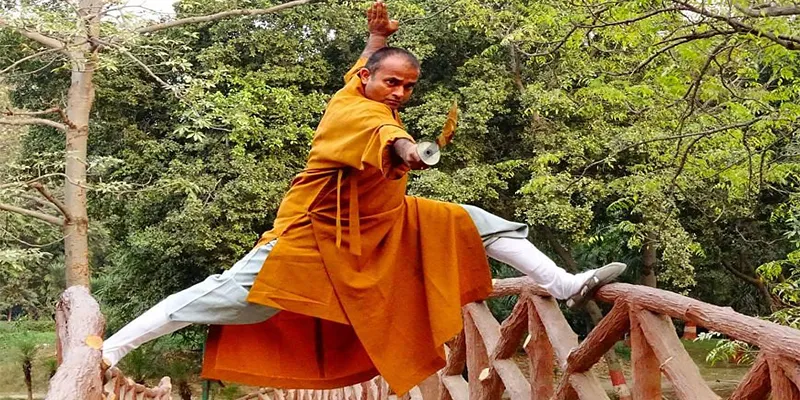
The most unique feature of Song Mountain Shaolin Kung Fu School is that students can train with Shaolin monks. The masters employed are not only strong in martial arts, but also have extensive teaching experience and are proficient in different traditional kung fu.
By choosing to join the Shaolin Kung Fu school training, students will not only learn Kung Fu skills, but will also have the unique opportunity to live and study with Shaolin monks.
Kunyu Mountain Shaolin Martial Arts Academy
Kunyu Mountain Shaolin School is located in Kunyu Mountain, the birthplace of Taoism. In addition to traditional Shaolin Kung Fu, the school also teaches Chinese martial arts like Wing Chun (Professional Masters in Wingtsun lineage), Chi Kung (Qigong), Tai Chi, Wudang, Xingyi, Bagua, Baji, Mantis boxing, and Sanda (Chinese kickboxing). Short-term students pay approximately $900 per month, while long-term students pay around $800 per month.
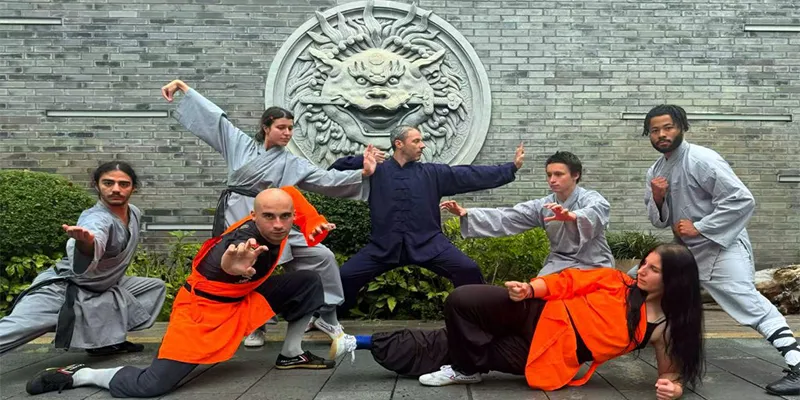
The school’s Shaolin masters are authentic monks from the Shaolin Temple, while other martial arts styles are taught by experienced masters with many years of martial arts training. Optional free Chinese culture classes are also offered.
The training is rigorous and disciplined, with a rich kung fu curriculum. Students are provided with tableware, bedding, a washing machine, and hot showers. The large training hall includes a full set of fitness equipment, strength training equipment, wooden blocks, mats, protective gear, sandbags, gloves, and security services.
What is the Best Kung Fu School in China?
Choosing the “best” Kung Fu school in China is subjective and depends on your personal goals, preferred style, and desired experience. China has numerous renowned schools, each with unique strengths in traditions, training intensity, and culture. Here are the top Kung Fu schools; follow this guide to help you choose.
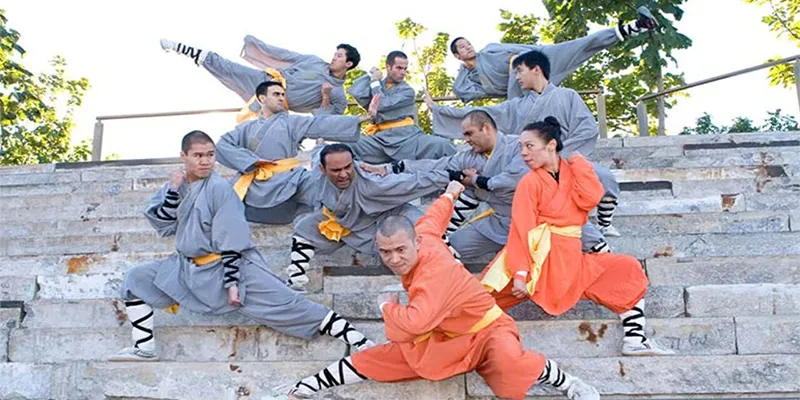
Shaolin Tagou Martial Arts School
Location: Dengfeng, Henan Province, near the Shaolin Temple.
Styles: Shaolin Kung Fu, Tai Chi, Qi Gong, and performance-oriented Wushu.
Key Features: This is the largest martial arts school in the world, often described as a “kung fu empire.” It houses thousands of students, mostly Chinese children and teenagers, but also trains foreigners in small groups (max 10/group). Training is intense, with 6+ hours daily, 6 days a week. It’s ideal for those seeking rigorous, traditional Shaolin training in a large-scale, immersive environment near the birthplace of Shaolin Kung Fu. The school provides full room and board.
Kunyu Mountain Shaolin Martial Arts Academy
Location: Foot of Kunyu Mountain, Yantai, Shandong Province.
Styles: Traditional Shaolin Kung Fu, Taoist influences, and Chinese culture.
Key Features: Nestled in a serene, environmentally protected area with rich Taoist heritage, this school offers a peaceful retreat for training. It focuses on a holistic approach, combining martial arts with cultural studies. The teaching team is stable, with masters often working there for 5-10+ years. It’s well-suited for those seeking a quieter, culturally immersive experience away from major urban centers.
Wudang Mountain Kung Fu Academy
Location: Wudang Mountain, Hubei Province.
Styles: Internal martial arts like Tai Chi, Baguazhang, Xingyi Quan, and Taoist practices.
Key Features: As a leading school for Wudang Kung Fu, it emphasizes spiritual development, philosophy, and health alongside physical training. Masters are highly qualified (some holding the highest level 9 grading). Training involves 5+ hours daily, 5 days a week, in small groups. Perfect for those interested in the internal, soft styles deeply connected to Taoism .
Shaolin Temple Kung Fu Academy
Location: Entrance of Mount Song Shaolin Temple, Dengfeng, Henan.
Styles: Authentic Shaolin Kung Fu, traditional forms, and applications.
Key Features: Founded in 1978, it claims to be one of the earliest and most famous academies. It is deeply integrated into the Shaolin Temple scenic area, offering proximity to the temple’s history and culture. The training is comprehensive, covering various aspects of Shaolin arts. It’s a strong alternative to Tagou for those seeking a reputable Shaolin school with a long history .
Shaolin Temple Cultural Center
Location: Handan City, Hebei Province.
Styles: Shaolin Kung Fu, Wing Chun, Sanda, Tai Chi, Qi Gong, and Buddhist culture.
Key Features: Founded by a 34th-generation Shaolin monk, this school is particularly tailored for foreign students. It emphasizes cultural understanding alongside martial arts training, including meditation and philosophy. The environment is described as serene and supportive, making it suitable for beginners and those seeking a deep cultural exchange rather than just physical training.
Shaolin YunTai Mountain International Culture and Martial Arts School
Location: Near YunTai Mountains, Henan Province.
Styles: Shaolin Kung Fu, Wushu, Sanda, Tai Chi, and Qi Gong.
Key Features: This school offers a balanced environment—traditional yet close to a modern city. It provides all-inclusive training with optional free Mandarin lessons, calligraphy, and tea ceremony classes. Certified by the Shaolin Temple, it welcomes all ages and skill levels and emphasizes training in small groups for faster progress. Good for those wanting a mix of traditional Kung Fu and modern amenities.
What is the Best Age to Learn Kung Fu?
There is no “best” age to learn Kung Fu. You can start at almost any age. However, the focus and advantages of Kung Fu training will differ depending on whether you are a child, a teenager, or an adult.
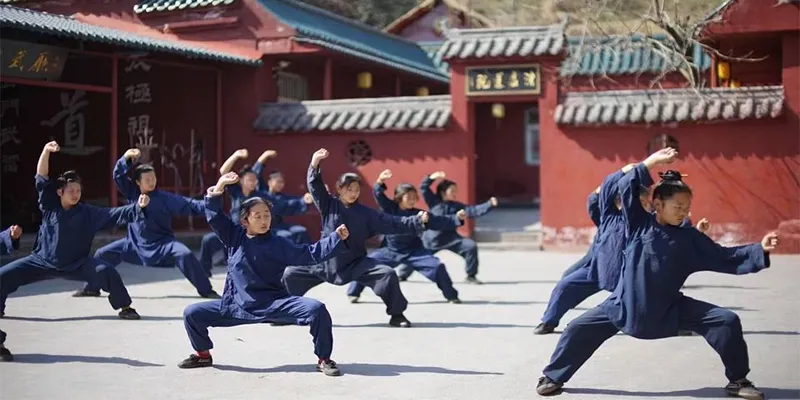
- Children (Ages 4-7): Best for building fundamentals, discipline, and fun.
This is a fantastic age to introduce Kung Fu. Training is very basic—simple stances, punches, kicks, and games that teach core. The goal is to instill a love for the art, not to create a master.
Benefits:
- Motor Skills: Develops coordination, balance, and body awareness.
- Discipline and Focus: Learns to follow instructions, respect teachers, and concentrate on tasks.
- Confidence and Social Skills: Building self-esteem in a supportive environment and interacting with other children.
- Fun: Classes for this age group are often game-based, keeping them engaged and active.
- Pre-Teens and Teenagers (Ages 8-17): Best for rapid skill acquisition, physical fitness, and character building.
This is the prime age to start serious training. This is the age when many famous martial artists began their training. They can train with high intensity and dedicate years to achieving mastery.
Benefits:
- Physical Prowess: Teens have abundant energy, rapidly developing strength, and great flexibility, allowing them to master complex techniques and forms (taolu).
- Cognitive Ability: They can understand deeper philosophical concepts, strategies, and the applications of movements.
- Discipline & Stress Relief: Provides a structured, positive outlet for energy and stress, helping navigate the challenges of adolescence.
- Building Identity: Fosters confidence, resilience, and a strong work ethic that benefits all areas of life.
- For Adults (Ages 18+): Best for stress management, holistic health, self-defense, and personal fulfillment.
It is a common thought that you must start as a child. It is never too late to start learning Kung Fu. Adults may need to be more mindful of warming up to prevent injury and might progress slightly slower in areas like flexibility than a child. However, an adult’s discipline, life experience, and clear personal goals can lead to incredibly rewarding progress.
Benefits:
- Health & Fitness: Excellent for strength, cardiovascular health, flexibility, and weight management.
- Mental Wellbeing: A powerful tool for reducing stress, improving focus, and practicing mindfulness.
- Self-Defense: Adults can directly appreciate and learn practical self-defense applications.
How to Enter a Kung Fu School In China?
If you’re dreaming of training at a Kung Fu school in China, here’s a guide to help you finish the process.
Start by researching various Kung Fu schools. China offers a diverse range of schools, each with unique styles, environments, and training focuses. For instance, some schools are located near the historic Shaolin Temple and emphasize traditional Shaolin Kung Fu, while others, like those in the Wudang Mountains, might focus more on internal martial arts like Tai Chi. Consider factors like the style of Kung Fu taught, the school’s location, training intensity, accommodation options, and cost. Many schools have detailed websites with information about their programs, masters, and daily life.
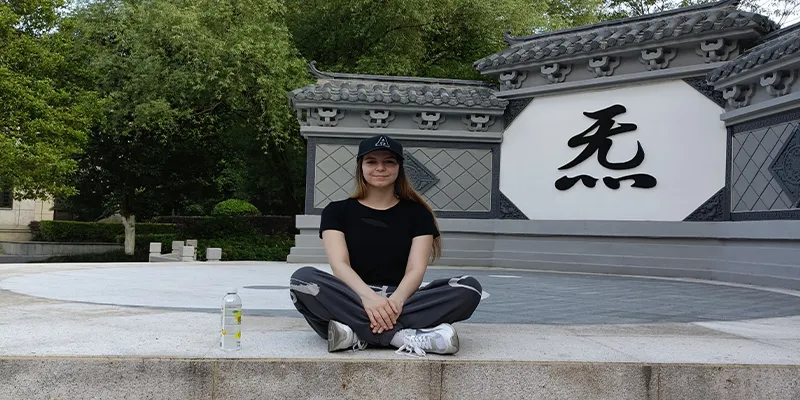
Once you’ve chosen a school, the next step is to apply. Most schools have an online application form on their website. You’ll typically need to provide personal details, your martial arts experience, your intended duration of stay, and your interests in specific Kung Fu styles.
After submitting your form, schools usually respond quickly, often within a few business days. Some schools may require an application fee (e.g., $100 USD) to secure your spot.
A crucial step is obtaining the correct visa for training in China. Most international students will need either a tourist (L) visa or a study (X2) visa for stays under 180 days.
To support your visa application, the Kung Fu school will usually provide you with an official invitation letter and an admission notice. You’ll need to submit these documents, along with your passport, completed application form, photo, and proof of sufficient funds, to the nearest Chinese embassy or consulate in your home country. Visa processing times and fees can vary, so it’s advisable to apply well in advance of your planned departure.
Book your flights to China. Major international airports like Beijing Capital (PEK), Shanghai (PVG), or Guangzhou (CAN) are common entry points. From there, you might need to take a domestic flight or a bullet train to a city closer to your school.
Many schools offer complimentary pickup services from a designated local airport or train station. Be sure to coordinate your arrival details with the school in advance.
Learning Kung Fu in China is more than just physical training; it’s a deep cultural immersion. Be open to learning about Chinese language, philosophy, calligraphy, and tea ceremony, which some schools offer as part of their program. As one school advises, don’t complain, and approach the experience with an open mind and a willingness to adapt.

